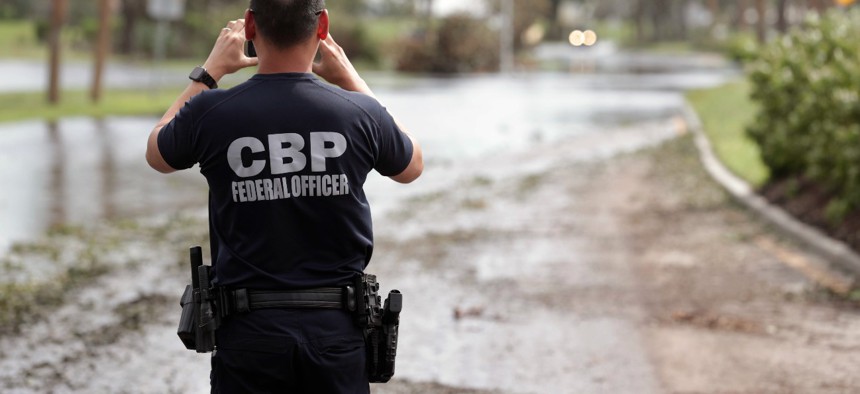
Customs and Border Protection is one of the agencies that will have to start meeting the new requirements. Glenn Fawcett / CBP
The DHS Is Going to Have to Start Buying More Uniforms and Equipment from Small, Domestic Firms
This requirement was included in the fiscal 2023 National Defense Authorization Act.
In the coming months and years, the Homeland Security Department is going to have to buy more of its uniforms and equipment from domestic small businesses.
The fiscal 2023 National Defense Authorization Act that President Biden signed on December 23, 2022, includes the bipartisan Homeland Procurement Reform Act. This bill deals with uniforms; footwear; holsters and tactical pouches, patches, insignia and embellishments; protective gear; and body armor for Customs and Border Protection, Immigration and Customs Enforcement, the Secret Service, the Transportation Security Administration, the Federal Protective Service, the Federal Emergency Management Agency, Federal Law Enforcement Training Centers and the Cybersecurity and Infrastructure Security Agency.
“The COVID-19 pandemic exposed glaring gaps in our domestic supply chain that left our nation flat-footed during the greatest public health crisis of our lifetime,” Sen. Jeanne Shaheen, D-N.H., one of the bill’s sponsors, said in a press release last month. “This is a necessary and forward-looking effort that will help ensure those defending our national security will always have the materials they need to stay safe on the job when a crisis strikes, while also incentivizing additional investment in American manufacturing.”
The bill requires, to “the maximum extent possible,” that no less than one-third of the funds obligated in a fiscal year for the covered items should be used to procure items “manufactured or supplied in the United States by entities that qualify as small business concerns,” which are U.S. for-profit organizations that are independently owned and operated and don’t dominate in their field of work, reads the text of the authorization act. “This section applies with respect to a contract entered into by the department or any frontline operational component on or after the date that is 180 days after the date of the enactment of this section.”
In the case of a national emergency or major disaster, both of which are declared by the president, the DHS secretary can waive the requirements. No more than 60 days after the secretary decides the waiver is needed, the secretary must report it to the Senate Homeland Security and Governmental Affairs and Appropriations committees and House Homeland Security, Oversight and Reform, and Appropriations committees.
There are also reporting requirements to Congress, such as on vendors who failed to meet deadlines for covered items. Also, the law requires DHS to issue a report no more than 180 days after the bill is enacted with recommendations on how DHS could procure other items from domestic sources in order to boost the domestic supply chain for national security-related items and personal protective equipment and other items needed to respond to the COVID-19 pandemic.
The Warrior Protection and Readiness Coalition, which is an advocacy organization for tactical equipment, apparel, materials and technology companies, applauded the inclusion of this bill in the authorization act.
“Currently, many DHS agencies purchase uniforms and equipment manufactured in foreign countries that lack supply chain dependability and secure protocols for handling sensitive uniform items,” said a press release from the coalition on Monday. “The [act] builds upon procurement laws such as the Berry Amendment and the Kissell Amendment by expanding opportunities for American manufacturers that meet specific, domestic manufacturing criteria.”
According to the Congressional Budget Office, which scored the standalone bill in the fall before it was included in the defense policy act, the covered agencies “currently spend $100 million on 1,500 items annually under the [current] contract, which covers the majority of items subject to the bill’s requirements.” CBO estimated that DHS would need to procure 150 of those items from new sources in order to meet the legislation’s requirements.
Also, “CBO estimates that each item that is re-sourced from domestic small business manufacturers would cost about 100% more,” said the scoring. Based on conversations with DHS, “CBO anticipates that DHS would gradually procure items from domestic small business manufacturers beginning in fiscal year 2025.”







